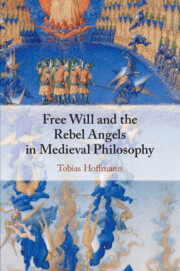Book contents
- Free Will and the Rebel Angels in Medieval Philosophy
- Free Will and the Rebel Angels in Medieval Philosophy
- Copyright page
- Dedication
- Contents
- Acknowledgments
- Abbreviations
- Citation Method
- Introduction
- Part I Free Will
- Part II Whence Evil?
- Part III Angelic Sin
- Chapter 8 Intellectualist Accounts of the Angelic Fall
- Chapter 9 Voluntarist and Intermediary Accounts of the Angelic Fall
- Chapter 10 Necessary (and Free?) Obstinacy
- Conclusion
- Bibliography
- Index of Manuscripts
- Index
Chapter 10 - Necessary (and Free?) Obstinacy
from Part III - Angelic Sin
Published online by Cambridge University Press: 26 November 2020
- Free Will and the Rebel Angels in Medieval Philosophy
- Free Will and the Rebel Angels in Medieval Philosophy
- Copyright page
- Dedication
- Contents
- Acknowledgments
- Abbreviations
- Citation Method
- Introduction
- Part I Free Will
- Part II Whence Evil?
- Part III Angelic Sin
- Chapter 8 Intellectualist Accounts of the Angelic Fall
- Chapter 9 Voluntarist and Intermediary Accounts of the Angelic Fall
- Chapter 10 Necessary (and Free?) Obstinacy
- Conclusion
- Bibliography
- Index of Manuscripts
- Index
Summary
Chapter 10 studies theories of demonic obstinacy, the state in which the fallen angels or demons are unable to avoid sinning and have a limited ability to do good. The external cause of obstinacy is God’s refusal to offer them the grace of repentance and of justification. Beginning with Aquinas, theologians searched in addition for an internal, psychological cause of their obstinacy – a great challenge, given their shared belief that the angels’ will is by nature oriented to the good. Aquinas traces their obstinacy to the fixity of their cognition, and Henry of Ghent to the forcefulness of their will. Certain Franciscan thinkers explain the demons’ obstinacy by means of a divine intervention, binding their will to evil (Olivi), causing their immoderate self-love (Scotus), causing in them a habit of wickedness (Auriol), or even causing in them hatred of God (Ockham). Durand of St. Pourçain returns to the standard account prior to Aquinas, which explains the demons’ obstinacy by a divine decision, with no reference to their psychological condition. In addition to the cause of obstinacy, theologians discussed whether the demons, though necessarily obstinate, are nevertheless free.
Keywords
- Type
- Chapter
- Information
- Free Will and the Rebel Angels in Medieval Philosophy , pp. 243 - 262Publisher: Cambridge University PressPrint publication year: 2020

